
CLINICAL HEMORHEOLOGY AND MICROCIRCULATION
Scope & Guideline
Exploring the Dynamics of Blood Viscosity and Microvascular Function
Introduction
Aims and Scopes
- Hemorheology Research:
The journal emphasizes studies exploring the properties of blood flow and the behavior of blood cells under various physiological and pathological conditions, contributing insights into disorders like diabetes, cardiovascular diseases, and hematological conditions. - Microcirculation Studies:
Research on microcirculation covers the dynamics of blood flow within the smallest vessels, focusing on how microvascular function impacts overall health, disease progression, and recovery. - Diagnostic Imaging Techniques:
The journal publishes papers on advanced imaging methods, particularly ultrasound and contrast-enhanced imaging, that improve diagnostic accuracy and treatment outcomes in various medical conditions. - Therapeutic Applications:
It includes research on therapeutic interventions that target hemorheological properties and microvascular function, exploring new treatment modalities for conditions such as ischemia, diabetes, and vascular disorders. - Translational Research:
The journal encourages studies that translate laboratory findings into clinical applications, fostering collaborations between basic scientists and clinical researchers to enhance patient care.
Trending and Emerging
- Artificial Intelligence in Diagnostics:
There is a rising trend in the application of artificial intelligence and machine learning techniques in diagnostic imaging, particularly ultrasound, enhancing the accuracy of assessments and predictions in various medical conditions. - Microvascular Dysfunction in Systemic Diseases:
Research exploring microvascular dysfunction as a common pathway in systemic diseases, such as diabetes and COVID-19, is gaining traction, highlighting the importance of microcirculatory health in overall disease management. - Personalized Medicine Approaches:
An increasing focus on personalized medicine, including the use of biomarkers and individualized treatment protocols based on hemorheological profiles, is emerging as a critical theme in clinical research. - Innovative Therapeutic Strategies:
Emerging studies on novel therapeutic strategies targeting microvascular and hemorheological parameters, including new pharmacological agents and techniques like ultrasound-guided therapies, are becoming prominent. - Integration of Multimodal Imaging Techniques:
The trend towards integrating multiple imaging modalities, such as combining ultrasound with other imaging techniques, to provide comprehensive assessments of vascular and microcirculatory health is increasingly evident.
Declining or Waning
- Basic Hemorheological Studies:
Research focusing solely on the basic rheological properties of blood without clinical correlations has decreased, as there is a growing emphasis on translational research that links basic science to clinical outcomes. - Single Modality Imaging Techniques:
The use of conventional imaging techniques without integration into multimodal approaches is declining, as the field trends towards comprehensive imaging strategies that combine various modalities for improved diagnostic accuracy. - Generalized Vascular Research:
Research that broadly examines vascular health without specific focus on hemorheology or microcirculation dynamics has lessened, as the journal has shifted to more targeted studies that delve deeper into specific conditions and their vascular implications.
Similar Journals
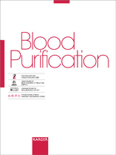
BLOOD PURIFICATION
Championing Interdisciplinary Approaches in Blood Science.BLOOD PURIFICATION is a distinguished peer-reviewed journal published by KARGER, recognized for its in-depth exploration of the interdisciplinary topics surrounding blood purification technologies and techniques, encompassing nephrology and hematology. Since its inception in 1983, this reputable journal has provided a vital platform for disseminating groundbreaking research, reviews, and clinical practices aimed at advancing the understanding and management of blood-related conditions. With an impressive impact factor positioned within the second quartile (Q2) in the fields of Hematology, Nephrology, and Miscellaneous Medicine (2023), BLOOD PURIFICATION is highly regarded among researchers and professionals dedicated to enhancing patient outcomes. The journal aims to foster a collaborative academic environment, sharing innovative findings and methodologies, making it an essential resource for scholars, clinicians, and students alike. This publication does not currently offer Open Access options, and is based in Switzerland, with its editorial office located at Allschwilerstrasse 10, CH-4009 Basel. Engage with BLOOD PURIFICATION to stay at the forefront of advancements in blood purification science.
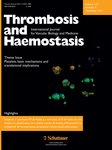
THROMBOSIS AND HAEMOSTASIS
Transforming Understanding of Hematological DisordersTHROMBOSIS AND HAEMOSTASIS is a prestigious journal published by GEORG THIEME VERLAG KG, dedicated to advanced research in the field of hematology. With an esteemed Impact Factor and recognized as Q1 in its category for 2023, the journal is regarded for its pivotal role in disseminating significant findings that contribute to our understanding of thrombosis and hemostasis. Since its inception in 1976, this journal has continuously published cutting-edge studies and reviews, making it a vital resource for researchers, healthcare professionals, and students alike. The journal’s commitment to high-quality research is reflected in its impressive Scopus Ranking of #18 out of 137 in Medicine - Hematology, placing it in the 87th percentile among its peers. Although not currently open access, THROMBOSIS AND HAEMOSTASIS remains an authoritative source for exploring novel therapeutic strategies and the latest scientific advancements in the field. Based in Stuttgart, Germany, this journal serves as a critical platform for sharing knowledge and fostering collaboration within the global hematology community.

JOURNAL OF CEREBRAL BLOOD FLOW AND METABOLISM
Elevating research in cardiology and neurology.JOURNAL OF CEREBRAL BLOOD FLOW AND METABOLISM, published by SAGE PUBLICATIONS INC, stands as a premier resource in the fields of Cardiology and Neurology, with a remarkable impact on our understanding of cerebral physiology since its inception in 1981. This esteemed journal, boasting a Q1 ranking in multiple categories, including Cardiology and Neurology, offers cutting-edge research articles that delve into the intricacies of cerebral blood flow and metabolic processes, essential for advancing both theoretical and clinical applications. With its significant placement in the Scopus rankings—12th in Neuroscience and 24th in Cardiovascular Medicine—this journal is pivotal for professionals, researchers, and students dedicated to the forefront of medical science. Although open access options are not currently available, the journal remains committed to disseminating high-quality research that addresses the challenges faced in cerebral health, ultimately guiding clinical practice and policy formulation. With an anticipated convergence extending through 2024, the JOURNAL OF CEREBRAL BLOOD FLOW AND METABOLISM continues to be an indispensable asset within the scientific community.
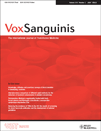
VOX SANGUINIS
Unraveling the Complexities of Blood HealthVOX SANGUINIS is a distinguished peer-reviewed journal in the fields of Hematology and Medicine, published by Wiley, a leading academic publisher based in the United Kingdom. With a rich history dating back to its inception in 1952, this journal has consistently provided a platform for innovative research and insightful reviews, advancing the understanding of blood-related disorders and therapies. As evidenced by its robust performance—ranking #57 out of 137 in Scopus for Medicine in Hematology and holding a Q2 classification in both Hematology and miscellaneous Medicine categories—VOX SANGUINIS is recognized for its significant contributions to the scientific community. This journal serves as a vital resource for researchers, professionals, and students alike, fostering knowledge exchange and collaboration within the field. With its ongoing commitment to quality and integrity, VOX SANGUINIS continues to shape the future of hematological research well into 2024 and beyond.

ARTERIOSCLEROSIS THROMBOSIS AND VASCULAR BIOLOGY
Elevating the understanding of arterial health and vascular biology.ARTERIOSCLEROSIS THROMBOSIS AND VASCULAR BIOLOGY, published by Lippincott Williams & Wilkins, is a leading journal in the field of cardiovascular medicine, dedicated to the advancement of research surrounding arterial diseases, thrombosis, and vascular biology. With an impressive impact factor indicative of its reach and influence, this journal occupies a prominent position in the Q1 category of cardiology, ranking 13th out of 387 in its field according to Scopus, placing it within the top 96th percentile among cardiovascular research journals. Since its inception in 1990, ARTERIOSCLEROSIS THROMBOSIS AND VASCULAR BIOLOGY has been pivotal in disseminating cutting-edge research that drives innovation and education in cardiovascular health. Although it does not operate under an open access model, the journal is a vital resource for researchers, clinicians, and students looking for high-quality, peer-reviewed articles that contribute to the understanding and treatment of cardiovascular and vascular disorders. Its commitment to rigorous scientific standards and its focus on impactful findings make it an essential publication for anyone dedicated to the field.

Neurosonology and Cerebral Hemodynamics
Advancing the Frontiers of Neurovascular ResearchNeurosonology and Cerebral Hemodynamics is a notable academic journal published by the Bulgarian Society of Neurosonology & Cerebral Hemodynamics, dedicated to advancing the field of neurosonology and exploring the dynamics of cerebral blood flow. With an ISSN of 1312-6431, this journal serves as a vital platform for researchers, clinicians, and students interested in the latest methodologies and clinical applications related to ultrasound techniques in neurovascular studies. While the journal does not currently have open access options, it remains a respected source for peer-reviewed articles that contribute to both theoretical insights and practical advancements in neurosonology. The journal aims to disseminate cutting-edge research and foster collaboration among professionals in neurology, radiology, and vascular biology, thereby enhancing the understanding of cerebral hemodynamics in health and disease. As the field continues to evolve, Neurosonology and Cerebral Hemodynamics plays a critical role in shaping future research and clinical practices.

Indian Journal of Hematology and Blood Transfusion
Elevating Knowledge: Your Source for Hematology ExcellenceIndian Journal of Hematology and Blood Transfusion, published by SPRINGER INDIA, serves as a leading platform for disseminating original research, reviews, and case studies in the field of hematology. With an ISSN of 0971-4502 and E-ISSN 0974-0449, this journal has been instrumental in advancing knowledge from 2000 to 2024, providing insights into critical issues surrounding blood disorders and transfusion practices. Currently ranked in the Q3 category for Hematology for 2023, it reflects a commitment to high-quality scientific content amidst a competitive landscape where it ranks 97/137 in Scopus for Medicine - Hematology, placing it in the 29th percentile of its peers. The journal primarily addresses a diverse readership, including researchers, healthcare professionals, and students, aiming to foster innovation and collaboration within the field. Although it operates under a subscription model, access options for individual articles and institutional subscriptions ensure that valuable research is disseminated widely to enhance medical practice and education in hematology.
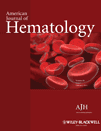
AMERICAN JOURNAL OF HEMATOLOGY
Pioneering Insights for Tomorrow's HematologyAmerican Journal of Hematology, published by Wiley, stands as a premier outlet for the dissemination of cutting-edge research in the field of hematology. With a commendable impact factor and ranked #9 out of 137 in the Scopus medicine category, this journal has established a robust presence since its inception in 1976. Operating in the Q1 quartile for hematology, it serves as a crucial resource for researchers, clinicians, and students dedicated to understanding blood disorders and advancing treatment methodologies. While the journal does not currently offer open access options, it remains highly regarded for its rigorous peer-review process and impactful contributions to the scientific community. With coverage extending into 2024, the American Journal of Hematology is committed to fostering innovation and collaboration within the hematological sciences.
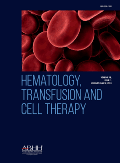
Hematology Transfusion and Cell Therapy
Fostering collaboration for groundbreaking blood health solutions.Hematology Transfusion and Cell Therapy, published by Elsevier, is a leading Open Access journal dedicated to advancing the fields of hematology, immunology, and transfusion medicine. Since its establishment in 2018, this journal has provided a vital platform for sharing innovative research and clinical advancements in the management of blood disorders and cellular therapies. Based in Brazil, it attracts a global audience, facilitating access to high-quality research that influences clinical practice and policy. With a current impact factor that places it in the Q3 category for both hematology and immunology as of 2023, the journal is recognized for its rigorous peer-review process and commitment to disseminating significant findings. By featuring a diverse range of articles, from original research to reviews, Hematology Transfusion and Cell Therapy aims to foster collaboration and knowledge sharing among researchers, professionals, and students alike, empowering them to tackle emerging challenges in their fields.
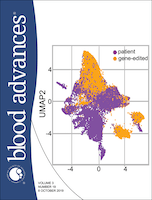
Blood Advances
Advancing the Frontiers of HematologyBlood Advances is a premier, peer-reviewed journal published by Elsevier, dedicated to the field of hematology. With an impressive impact factor and classified within the Q1 category of hematology for 2023, it ranks as the 16th out of 137 journals in the Scopus Medicine Hematology category, placing it in the top 88th percentile globally. This influential journal, which has been disseminating invaluable research since its inception in 2017, focuses on advancing knowledge and innovation in blood science, including clinical and laboratory aspects of hematology. Although it offers limited open access features, its comprehensive scope encompasses various topics relevant to both researchers and practitioners. Located in the United States and managed from Amsterdam, Blood Advances provides a vital platform for the dissemination of groundbreaking research, making significant contributions to the understanding and treatment of blood disorders. Researchers, professionals, and students alike will find this journal an essential resource for keeping abreast of the latest developments and advancements in hematology.